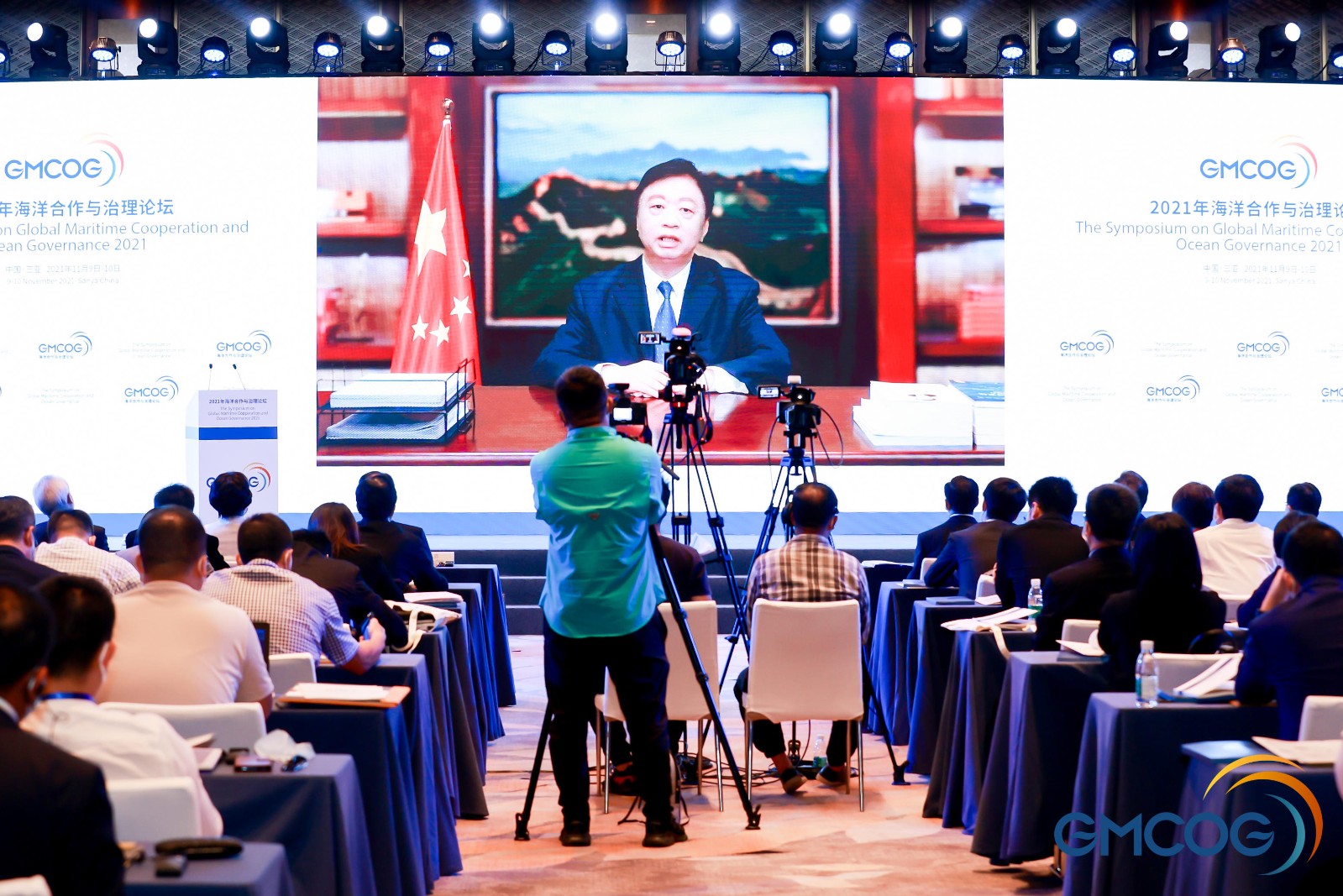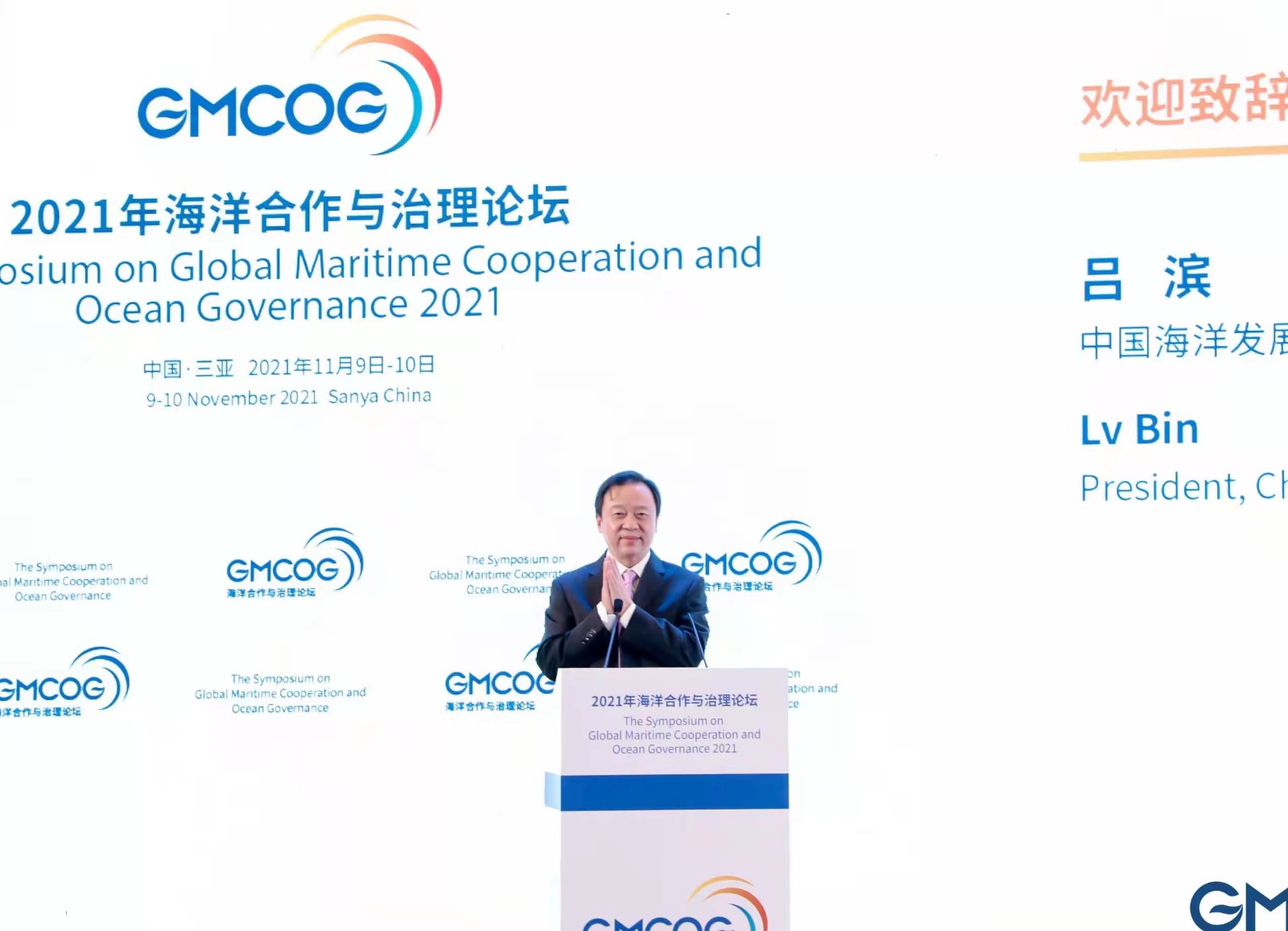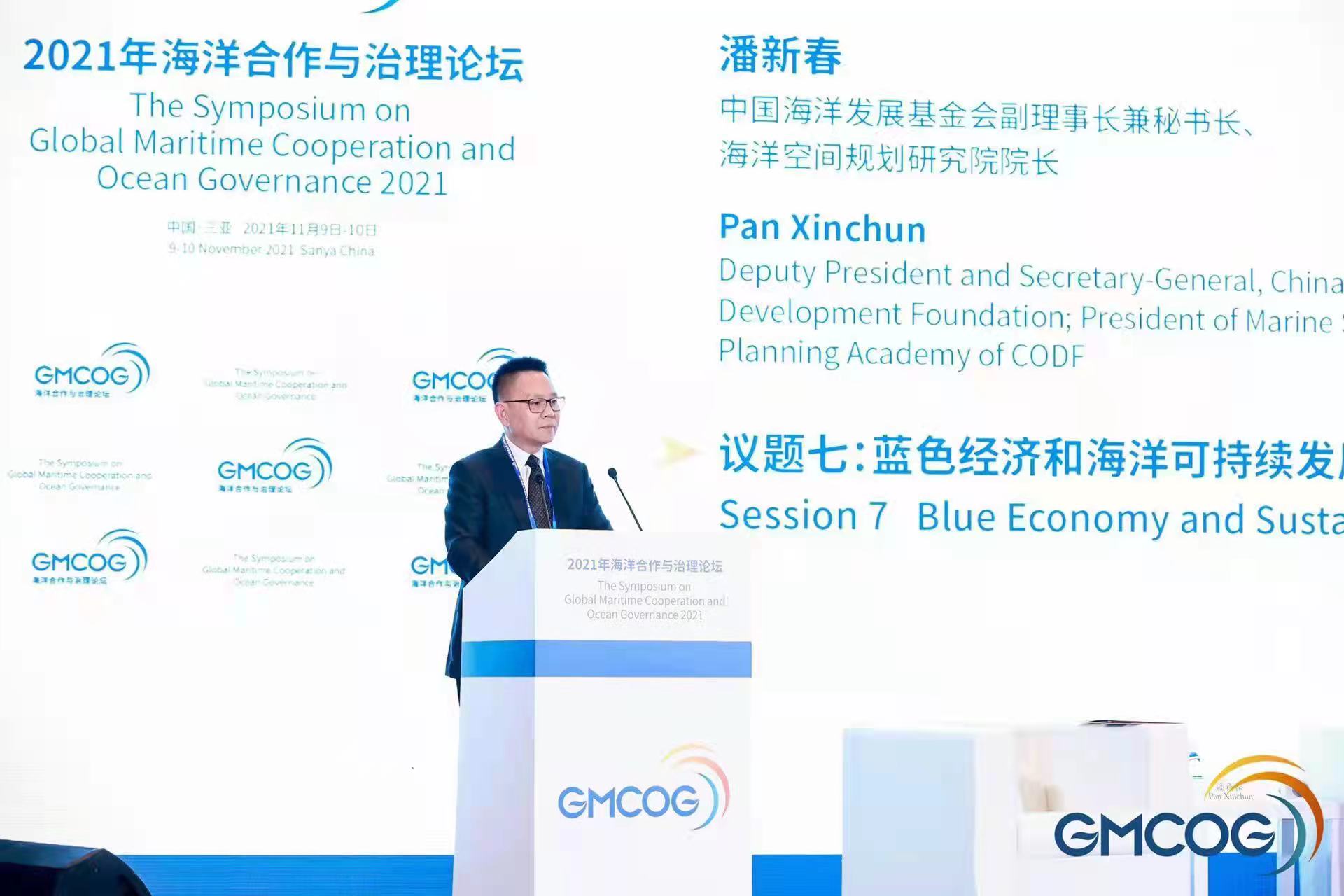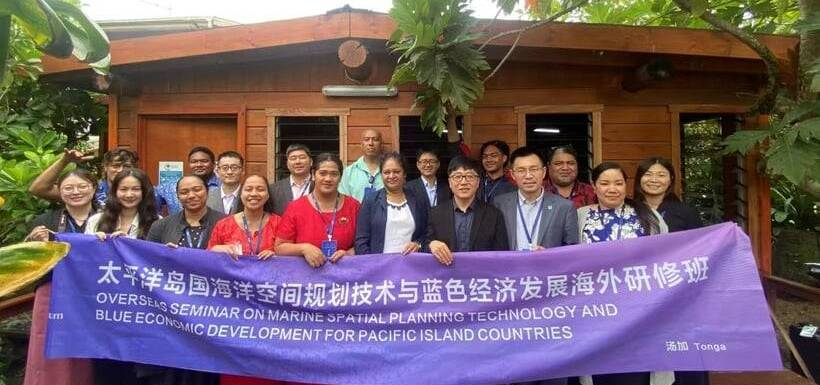News
The 2021 Symposium on Global Maritime Cooperation and Ocean Governance, co-hosted by the China-Southeast Asia Research Center on the South China Sea (CSARC), the National Institute for South China Sea Studies (NISCSS), and the China Oceanic Development Foundation (the Foundation), was successfully held in Sanya from November 9 to 10, 2021.
The opening ceremony was presided over by Wu Shicun, Chairman of the CSARC Council and founding President of NISCSS. Wang Yi, State Councilor and Foreign Minister; Wang Hong, Vice Minister of Ministry of Natural Resources and Director of State Oceanic Administration; Wu Jianghao, Assistant Minister of Ministry of Foreign Affairs; Wang Bin, Vice Governor of Hainan province; Liu Zhenmin, Deputy Secretary-General of the United Nations; Michael W. Lodge, Secretary-General of International Seabed Authority; Adnan Rashid Nasser Al-Azri, Chairman of Commission on the Limits of the Continental Shelf; Arroyo, former President of the Philippines; Lv Bin, Chairman of the Foundation; Wang Sheng, President of NISCSS, and other leaders attended the opening ceremony and made speeches. After the opening ceremony, seven parallel symposiums came off on "Opportunities and Challenges of Global Ocean Governance", "Building a Security Order in the South China Sea", "Practice of Ocean Governance in the South China Sea", "Research on Frontier Issues of International Maritime Law", "Practice of Ocean Governance in the Arctic Ocean", "International Maritime Security Cooperation under the Impact of COVID-19", and "Blue Economy and Sustainable Development of the Ocean". The young and the old, more than 3000 experts and scholars, former politicians, senior officials of foreign embassies in China, and representatives of international organizations and the marine departments from over 30 countries and regions such as China, the Philippines, Canada, Sweden, and Singapore, etc. gathered together to contribute comments or listen to the lectures by the combination way of "online" and "offline".
Wu Shicun stated the purpose and meaning of the symposium, its topic setting, and the establishment of seven parallel symposiums at the opening ceremony, introduced the Chinese and foreign leaders and leaders of the United Nations and other international organizations attending the event, and introduced the keynote speakers and distinguished guests offering comments, schedule of parallel symposiums, and organization and arrangement of Chinese and foreign participants online and offline, etc.
 Wu Shicun presiding over the opening ceremony of the symposium
Wu Shicun presiding over the opening ceremony of the symposium
Wang Hong pointed out in his speech that the ocean is a treasury of natural resources, an important regulator of global climate, and a strategic area for high-quality development. On this blue planet, it is the ocean that binds us together as a community with a shared future. No country can remain immune to the challenges posed by worsening global climate change, extreme weather, rising sea level, ocean acidification, deoxidation, frequent marine disasters, and loss of marine biodiversity. It is imperative for all countries to be united with one mind, and work together for a joint effort to respond to the common concerns of the international community, eliminate the deficit in global ocean governance, and realize the United Nations Sustainable Marine Development Goals. He put forward several proposals. First, strengthen policy coordination and enhance mutual trust. The clean and beautiful ocean with lasting peace, universal security, common prosperity, and openness and inclusion serves our common interests and aspirations. We should intensify synergy and integration of policies and concepts, adhere to the principle of dialogue and consultation, uphold the principle of mutual benefit and win-win results, take full account of the interests and concerns of all parties, participate in global maritime governance on an equal footing, and promote the building of a maritime community with a shared a future. Second, expand green cooperation to enhance the resilience of sustainable development of the ocean. We should reinforce cooperation on marine ecological protection and climate change tackling, jointly address issues such as marine habitat deterioration and biodiversity loss, etc., provide more public-serving products to the regions and the world, and enhance the capacity of countries tackling climate change and marine disasters. The R&D and industrial cooperation on marine scientific and technological innovation, marine renewable energy, marine biomedicine, marine information services, blue carbon sinks, and other emerging industries should be enhanced to promote a green and low-carbon way of production and life. Third, manage disputes and make relevant institutional arrangements. China firmly upholds and promotes the maritime rule of law and respects international laws including the United Nations Convention on the Law of the Sea. China stands ready to work with neighboring countries in the South China Sea to fully implement the Declaration on the Conduct of Parties in the South China Sea (DOC), steadily advance consultations on a Code of Conduct in the South China Sea (COC), carry out institutional design and cooperation arrangements for relevant activities in the South China Sea, and make contributions to peace, stability, prosperity, and development of the region.
 Wang Hong delivering a speech at the opening ceremony
Wang Hong delivering a speech at the opening ceremony
(Note: The speeches by State Councilor and Foreign Minister Wang Yi, Assistant Minister Wu Jianghao, and other leaders, as well as the full report of the symposium, have been published on the official website of the National Institute for South China Sea Studies, which will not be repeated in this report.)
In his speech, Lv bin, on behalf of the Foundation--one of the sponsors, extended a warm welcome and heartfelt thanks to the Chinese and foreign guests for their active participation in the symposium and their concern in ocean governance and cooperation. He said the Foundation will actively support global ocean governance and cooperation in the following respects. First, the Foundation will support innovative research and active exploration on major issues such as ocean governance system, capacity and mechanism carried out by the purposes and principles of the Charter of the United Nations, the plan of the United Nations Convention on the Law of the Sea and the concept of "a maritime community with a shared future" in the field of the international maritime order. The Foundation supports the United Nations Decade of Ocean Science for Sustainable Development. Second, in the area of marine environment protection, the Foundation supports social organizations, experts, and scholars to carry out research on conservation and restoration technologies for ecosystems such as coral reefs, mangroves, seagrass beds, and biodiversity, etc., conduct research on marine carbon sinks, and campaigns to raise awareness of marine conservation. Third, the Foundation backs up the maritime silk road countries to apply for maritime silk road project "Promoting Marine Spatial Planning and Contributing to Blue Economic Development" (the maritime silk road project), helps prepare the marine spatial planning, formulate ocean management system, establish marine information system, and cultivate marine talents, and organizes Chinese enterprise investment to develop the blue economy and conduct research on disaster reduction and prevention and major marine issues. In his speech at the dinner, Lv Bin said that the Foundation, as a strategic partner of CSARC and NISCSS, will continue to support the“Symposium on Global Maritime Cooperation and Ocean Governance”.
 Lv Bin addressing at the opening ceremony of the Symposium
Lv Bin addressing at the opening ceremony of the Symposium
Pan Xinchun, Vice Chairman and Secretary-General of the Foundation, chaired the parallel symposium on "Blue Economy and Sustainable Development of the Ocean". He pointed out that the exploitation and utilization of the ocean, the development of the blue economy, the maintenance of marine ecological balance, and the promotion of sustainable development of the ocean are the eternal themes of human thought and research. Human development and utilization of the ocean have promoted the progress of social civilization. However, in the nearly 200 years since the era of industrialization, human beings have continuously discharged excessive pollutants into the ocean, resulting in frequent disasters such as ocean acidification, water pollution, marine microplastic, green tide, and red tide, etc. Constantly excessive land reclamation has caused a sharp decrease and loss of functions of ecosystems on coastal coral reefs, mangroves, and seagrass beds, etc; Constantly excessive marine fishing and other activities give rise to the depletion of marine fishery resources; Constantly excessive emissions of greenhouse gases are creating global warming, rising sea levels, and an upsurge in extreme weather hazards. All these have become global issues threatening the survival and sustainable development of mankind.
He stressed that the best way for mankind to deal with the threats posed by the ocean is to treat well the ocean, protect the ocean and change the production method and lifestyle. He said that the Chinese government attaches great importance to marine protection and has set conservation, ecology, and sustainable development as national strategic policies. In terms of developing and utilizing marine resources and promoting the development of the blue economy, the government has launched many encouragement policies, such as resource conservation, moving towards the high seas, industrial transformation, optimization of business mode, tech-drive, innovation-orientation, and digital empowerment, etc. To protect the marine ecological environment and promote sustainable development of the ocean, China has formulated strict control measures for many areas, such as marine reclamation land, discharge of pollutants into the sea, ecological protection and restoration, intensity of fishing resources, and carbon emissions, etc., which have achieved new results in the implementation.
He said that the Foundation actively supports experts to carry out innovative research on systems and methods of global ocean governance, blue economy, and sustainable development of the ocean. He also introduced the phased outcomes of the Foundation on Maritime Silk Road project in 18 maritime silk road countries. He pointed out that the Foundation has carried out eight projects and has built eight platforms for China to go global and for foreign countries to come in. Guests from home and abroad are welcome to show their heroic demeanor on this platform. At the end of the parallel symposium, he stressed once again that mankind and the ocean share a common destiny. Caring about and protecting the ocean is to care about and protect ourselves. We must treat the ocean well and protect our homes.
At the parallel symposium on "Blue Economy and Sustainable Development of the Ocean", experts and scholars from dozens of countries, including China, Singapore, Japan, Thailand, and Malta, etc., made fascinating speeches and enthusiastically communicated with each other online and offline. Participants said that the host guests, speech experts, guests offering comments and questions on the spot for this parallel symposium discussed and expressed individual opinions and points of views for a collision of ideas and enlightenment over the theme, showing the participants’ commitment to the era, and it was an effective and benefiting conference of warm atmosphere and rich insight.
 Pan Xinchun presiding over the parallel symposium
Pan Xinchun presiding over the parallel symposium

- Marine Spatial Planning Study Tour 2023 Officially Launched
- President Lv Bin Met with Her Royal Highness of Tonga Pilolevu Tuita in Beijing and Signed a Memorandum of Understanding on Cooperation
- Dialogue eyes key role of youth in RCEP region's growth
- Pan Xinchun Attends the 2022 China Ocean Action Roundtable and Introduces Ten Major Actions



 Home
Home  About Us
About Us  Our Programs
Our Programs  Cooperative Partner
Cooperative Partner